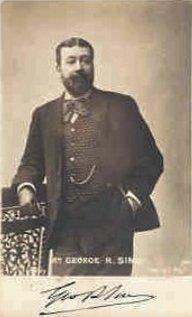
Nat Gould
His life and books
George Robert Sims 1847-1922

George Robert Sims was born in 1847, the son of a London wine merchant, the eldest of six children.
He had an exuberant sense of fun, sometimes mistaken for flippancy.
He adored the theatre and, although destined initially for the family firm, soon gave that up in order to write plays, stories and verse. He became a friend of W. S. Gilbert and Ambrose Bierce. For a Sunday paper he wrote its Mustard and Cress columns under the pen-name Dagonet. His collected verses, published as The Dagonet Ballads (1879) and Ballads of Babylon (1880), became immensely popular, as did his comic travelogues. The literati despised him, and he was savagely criticised and lampooned.
George Sims employed his literary skills in campaigning vigorously for social reform, graphically depicting the plight of the oppressed poor. He fought bad landlords and public authorities, took part in the Inquiry into social conditions in Southwark in 1882 and the Royal Commission on working-class housing in 1884. His articles in the Daily Telegraph campaigned against the white slave traffic, and he promoted the National Sunday League to open up museums, galleries and concert halls on Sundays. He wrote tracts against child abuse, and assisted the Boys' Clubs movement. He co-founded the Referee Children's Free Breakfast and Dinner Fund (1880), whose work anticipated the provision of free school meals for needy children in 1906.
For the theatre he was a brilliant writer of melodrama, burlesque, pantomime, and comic opera. He was the first playwright to have four plays running concurrently in West End theatres, as well as by many touring companies. In Faust Up-To-Date he introduced the phrase “up-to-date” into the English language. One performance of The Trumpet Call provided the audience with more comedy than intended when the costume of Mrs Patrick Campbell fell off and she was exposed in her drawers.
Sims made a great impression driving his trotting ponies in the royal parks. He was a passionate fan of horse-racing, boxing matches, and other sporting events. He played badminton and took strenuous walks. Patriotically he bred prize-winning bulldogs.
For his writing he sought “the admiration of the literary school of critics without sacrificing the commercial approval of the general public”. He preferred instant cash and popularity over critical reputation or literary immortality.
However it is in the field of legal reform that Sims found a place of the highest honour. After achieving the release and compensation of Adolf Beck, no British honour came his way, but George Sims was awarded a knighthood of the Order of St Olaf (First Class) by the king of Sweden and Norway in 1905 (1).
Nat Gould wrote a letter of congratulation to Sims (2) from his home Newhaven in Bedfont on 17 August 1895 (3).
(1) A summary of the work of G.R. Sims in the Beck case is given in his article "My Reminiscences" in The Strand Magazine volume 37 (1909) pages 31 and 32.
(2) Mitchell Library, the State Library of New South Wales, Australia : Mitchell Library ML DOC 1380.
(3) For details of the letter, and more information about G.R. Sims, see Nat Gould: The Biography by Tom Askey (2017) pages 86-87.
